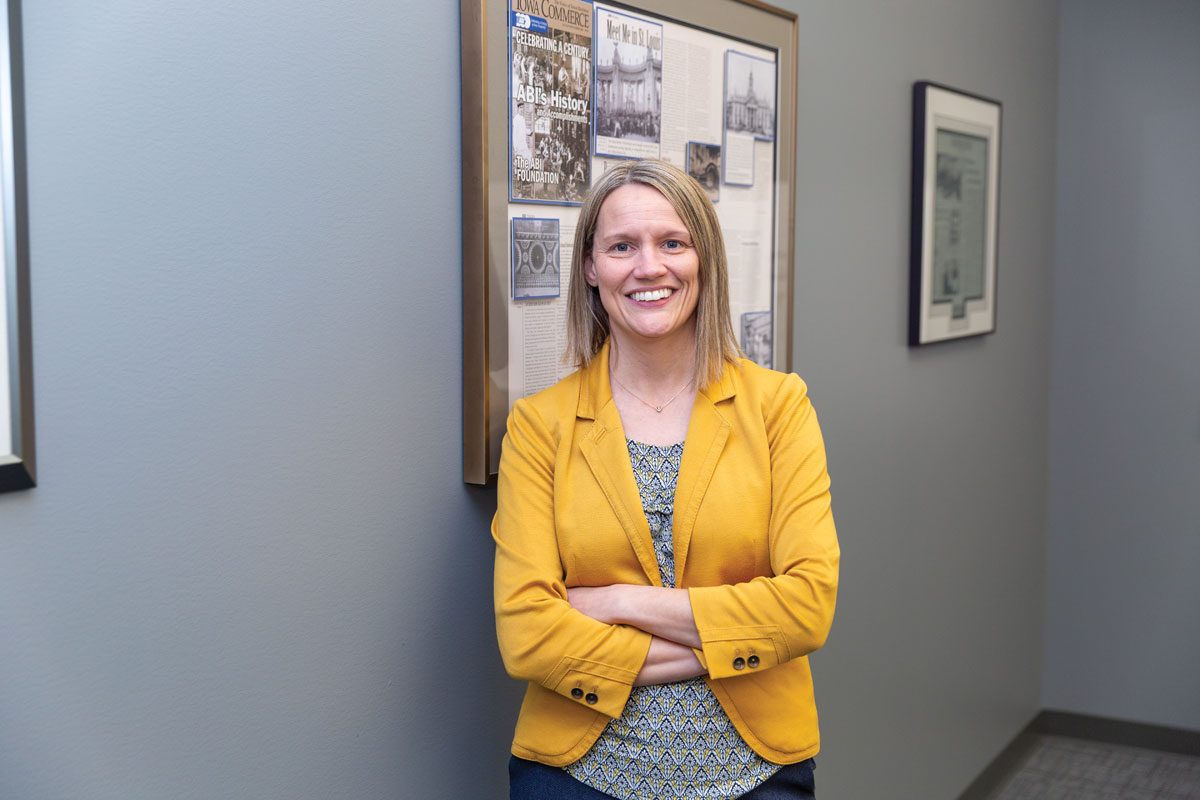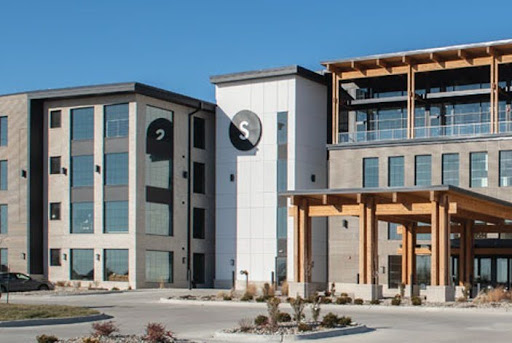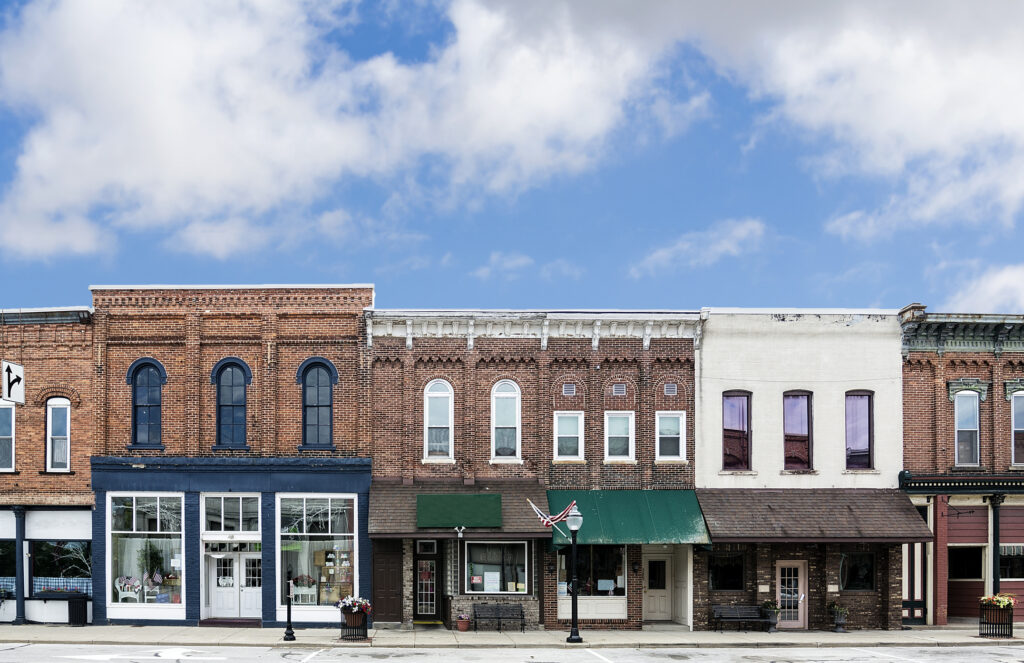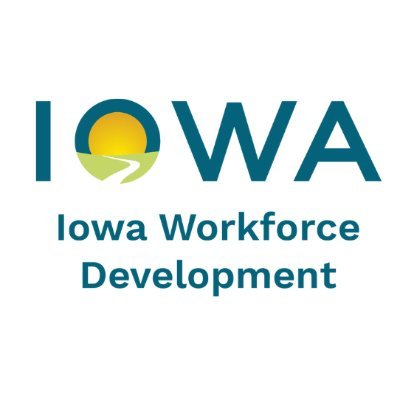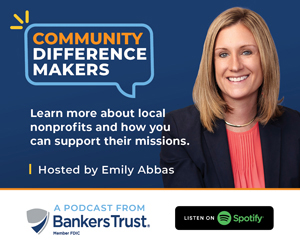A Closer Look: Nicole Crain

Gigi Wood Apr 11, 2025 | 6:00 am
13 min read time
3,156 wordsA Closer Look, Government Policy and LawNicole Crain found a good fit in her work at the Iowa Association of Business and Industry as the organization focuses on two of her top career passions: businesses and the state of Iowa.
She grew up in Blockton, a town of 125 people in southwest Iowa, where she developed a love for the state, and when she was a kid, she helped out with the family-owned restaurant, igniting an understanding and love for small businesses.
“The passion that I have for this organization, the members; I truly believe in what they do and the people they employ, and how they’re so integral and critical to Iowa being a sustainable, better state,” Crain said. “We need these businesses, and we need organizations like ABI to represent them.”
ABI, founded in 1903, is a statewide business association that supports a variety of industries and connects businesses through lobbying efforts, continued education and networking opportunities. ABI hosts events throughout the year, from legislative updates to educational webinars and its annual Taking Care of Business Conference, which this year is June 10-12 in Council Bluffs.
Crain’s history at ABI has made her knowledgeable not only of ABI’s mission and priorities, but of its member companies as well.
She joined ABI as director of government relations in 2007, serving until 2011. After a year as president of the Iowa Taxpayers Association, she returned to ABI in 2012 as senior vice president of public policy and vice president of government relations. She was promoted to executive vice president in 2019. Crain began her term as president on Jan. 1, filling the role held for nearly two decades by Mike Ralston.
Crain has dedicated much of her career to public policy and governmental relations. She studied political science and management at Simpson College, graduating magna cum laude, and was recognized as an outstanding alum in 2011. After college, she spent almost two years in Washington, D.C., working on federal issues for global agribusiness companies at the lobbying firm Lesher & Russell. She also worked in government affairs at Associated Builders and Contractors of Iowa.
Throughout the years, Crain has actively volunteered, mentoring young people and serving on boards. She serves as a board member for the Iowa Women’s Foundation, Business Industry Political Action Committee and Simpson College. She was recently appointed to the U.S. Chamber of Commerce’s Committee of 100, a group of chamber executives and business leaders from across the country who advise the U.S. Chamber’s board of directors on lobbying, programming and outreach. The Business Record sat down with Crain to discuss her career and new role.
This Q&A has been lightly edited for clarity and length.
What do you bring to this role?
I think passion for ABI and passion for Iowa, passion for ABI members. I grew up in rural Iowa and went to school in Bedford, Simpson for college. I went away for a very short amount of time, but I love the state. I appreciate how much members, how much companies – especially those small to midsized family-owned businesses – the decision they make every day to employ people, to invest in their companies to grow, to invest in their communities, to keep those communities sustainable and help them.
What does ABI do for businesses?
We were founded in 1903 as the Manufacturers Association; we were founded as an advocacy organization for manufacturers. As we look at state policies that are proposed or initiatives that are being discussed, we look at it from the lens of how is this going to affect the business climate in the state? How is this going to affect the people who employ individuals each and every day?
We have a grassroots process of 300 members who participate in our policy development process. When our policy experts are up at the Capitol representing ABI, they’re not representing their positions, they’re not representing the ABI staff position, they’re representing the positions of members, and so advocacy is a big thing that we do.
And also, connecting. Connecting people through our conferences, but connecting businesses to one another through introductions, through our communications, to help them learn from one another about challenges and opportunities they see in their businesses, but also how to grow their business; best-practice sharing. That’s a big part of what we do. That happens at our annual conference, it happens at our manufacturing conference, but it also happens, we’ll get a call from a member like, “Oh, I’m having a shortage of warehouse space. Do you know anyone that does this?” Or, “Do you know anyone that does co-manufacturing?” We have this statewide network in all 99 counties that we’re able to help businesses connect with suppliers, to connect with other vendors and just do business with one another.
There’s the foundation, too. ABI created the foundation in the 1980s with our Leadership Iowa program, and it’s really an issues awareness program. Again, I talk about how we’re statewide, but some people from Sioux City, let’s say, may have never been to Burlington or understand what’s happening there. We’ve followed the same format for 40 years that we go around the state, we take 40 diverse professionals and talk about the issues that are facing Iowa, and hear different perspectives and have a conversation about how we can all work together to provide solutions.
And then we have a high school, critical skills, entrepreneurial camp, at Drake, and a college program. I really see the foundation as the association’s legacy. These business leaders created this foundation as part of their legacy, but also the legacy and the future of Iowa. And so how do we maximize our foundation? It is a 501(c)(3), so how do we maximize it to really focus on those workforce initiatives and solutions? That’s where we created Elevate Iowa, that’s our newest initiative. And we just launched a new initiative last week at our Business Day in Des Moines about an RV tour that we’re doing this fall. But that’s really coming up with solutions and being a thought leader, and that’s really where the foundation has a lot of opportunity that we’re excited about.
How does ABI’s mission change or alter with you at the helm?
My predecessor was a great leader and brought this organization to where it is today, and his leadership and the leadership of the ABI board of directors and chairs has positioned us well. And as I’ve been traveling around the state, meeting board members and our members, one thing that I love about this organization, and that I think is unique to ABI being around for 122 years, is our legacy, and our notoriety in the public policy advocacy work that we do.
I think as we’re looking at, not necessarily change, but what’s going to stay the same, there’s a nod and commitment to the legacy of this organization and our founding roots in manufacturing. Because of where we are in the organization, because we’re in a very strong position, I have the opportunity with the board of directors and the staff to take us into our next 125 years. We’ll be 125 years old in 2028. As we’re talking about change, we on the association side are doing some things really well. There’s the opportunity, with different tools that we have in technology, to be more visible, to share our members’ stories statewide, to share ABI’s story, and what we can provide to businesses throughout the state that maybe haven’t heard of us before.
Then on the foundation side, it’s really ensuring that our programs continue to be transformational. People who have been through the program say that time and time again. But also, as I mentioned, just focusing on that opportunity to be a thought leader and look ahead at some of those priorities and initiatives. ABI has had a very successful legislative agenda for several years, and we are in a great situation as a state. So where do we go from here? Those are conversations that I’m looking forward to having with the board and with our members.
Why did you choose to stay with ABI throughout most of your career?
It’s a lot of things; the culture of the organization. Again, it goes back to the leaders and the board of directors and the members, and the way they treat the ABI team, the way they treat their employees. The policy positions that this organization stands for, I personally believe in, and it’s an honor to represent this organization and to represent these businesses.
The Iowa Taxpayers Association is a great organization. I missed some of those other issues, whether it be environmental compliance or employment issues or the annual conference, and I missed the diversity of the membership.
I also think, as you’re looking to develop your career, sometimes people see, “I don’t have any room to grow here. I’m not learning new things. I’m not being challenged.” And that’s what I think is great about ABI and our culture, and I hope that’s a culture that I’m empowering our team members with as well; that there’s always been opportunities for me to grow here and to learn something new every single day.
So whether it was when I was on the policy side and I was reading line by line, hundreds of bills, or going to the DNR and learning about environmental technical issues, or when I was in the executive vice president role and learning how we could utilize better software, it was always challenging me. And I always felt like I had the opportunity and was able to play a role in making the organization and the state a better place. We’re hiring right now, and people have been asking questions, and I’ve been saying it just feels like no matter the person’s role in this organization, that everyone, their contributions are needed, they’re welcomed and they’re appreciated, and so I think that’s what’s kept me here so long. And the opportunity to be able to continue that culture is exciting.
Can you take a moment to talk about ABI’s events and the conference this year?
This year, what’s exciting is we’ve never been to southwest Iowa to hold the annual conference. We’ve been in northwest Iowa. But being from southwest Iowa, I’m really excited.
I think just being over there, there’s a lot that people don’t know that’s happening in that part of the state. That’s what I think is cool about our conference. There’s only so many, unfortunately, venues that can host the event, as large as it is, but we’re able to move around the state and see what’s going on in those communities.
Council Bluffs, they’re doing a lot, and I don’t think everyone knows all the things that are happening in the community, whether that be the PACE performing arts center; we’re going to have a welcome reception there. That’s where we’re going to announce the Coolest Thing Made in Iowa again; that has been something that we just launched in the last year, and that’s really gained a lot of excitement.
We plan the annual conference, we started planning it two years before it even happens. We’re talking about 2027 contracts now, so some of these things have been in the works. I think that the focus of making sure there are lots of opportunities for people to informally connect with one another and do business continues to be the focus of that event.
I think another thing, too, is just making sure that we have membership and meetings around the state, as well as being out and about more. That’s something that we’ve already implemented. We’ve added some new team members and we’re making sure that we’re at the chamber dinners in the larger communities where we can be. I think that’s something you’ll see is just more meetings, and probably a few smaller meetings.
The Business Day Des Moines, that’s a relatively new event, too. This was our third year having it. We kind of fashioned that off of Wisconsin, actually. We used to do a Day on the Hill, and our numbers were decreasing, and so we talked about it; why don’t we bring the leaders to members? What’s nice now is they get to hear from the legislators what’s on their mind, and also get a national perspective on something. That’s been a growing event every year.
Can you tell us about any challenges ABI is facing now?
Like any organization, there’s challenges. And I think what’s great about the organization is that we have members in so many industries, including other associations, and so many of our member companies have experienced a lot through their business cycle. And so I’m confident that those challenges, as they come, we’ll be able to navigate through those.
From an association standpoint, we are on strong financial footing. Our member numbers are strong. Our foundation has great programs. As I look down the road, I think no matter what industry you’re in, there are always business cycles.
We work for the members, and we want to make sure that we’re laser-focused on the members and providing a return on their investment. That’s going to be my continued focus.
Because of the decisions that our board and leadership have made, we’ve positioned ourselves very well. Our challenges are just going to be what any business would face. I’m bullish on ABI and I’m bullish on Iowa. Our challenge, and it’s a good challenge, is making sure we’re serving the entire state and that people see that return on investment.
In the agricultural manufacturing space, what kind of conversations are you having with members, as that segment softens?
Businesses love certainty, right? As I think about ABI, we know our business cycle, we know our fiscal year. And businesses are the same way, and people just want to know what’s going to happen. They want to be able to predict. There’s always going to be surprises, but as much as we can, we are trying to predict and limit those.
ABI’s role is, as we’re looking at different policies that are being proposed, what are we hearing from members and how is it affecting them? What industries are getting the most affected?
We just sent out a quarterly survey on March 17. Now we’re looking at the second quarter. Those results are very, very strong, and I think everyone has seen the softening and can feel the softening. Our role is working with our national associations, working with national associations of manufacturers, the U.S. Chamber of Commerce, if we’re talking about trade policy, understanding by asking our members, “How would this affect you?”
I’m new to the role, so I’ve been out doing a lot of meetings, so I’ve heard firsthand how it does affect them, and it affects everyone differently, depending on what industry they are, even within sectors and where your raw materials come from.
We try to be prepared when we have those questions, that we understand how this affects our members, and that we’re able to communicate that to the media and to the public so they know what the effects will be.
What are you hearing from members about tariffs?
In our first member survey, we asked, “How do you feel about the tariffs?” referring to Mexico, Canada and China.
We talked to other states, and that’s another benefit to the role that we play, is we hear how it’s affecting our other Midwest manufacturers’ organizations or other state chambers of commerce, and they said that they separated out that question.
So this time, when we asked the survey questions, we said, “How concerned are you about the proposed tariffs on Canada, Mexico, China,” all three as separate questions, because obviously, depending what sector you’re in, it is going to affect you differently, and again, depending on what your raw materials are.
So that’s an area, just understanding where our members are in educating the media and educating the public about that, and in talking with our national partners, the U.S. Chamber, and also our congressional delegation, if they’re back in the state, or as they’re having conversations with us, and other business leaders, we’re able to tell them, “Here’s what we see on taxes,” for example.
The National Association of Manufacturers, they have a map of every state and how if the tax cuts were to expire, what does that mean in lost jobs for every state? And so we also help share their messaging out as well, to say here’s how it affects Iowa, and this is how it affects these congressional buildings, congressional districts. So that’s not information that we have research on, on our own, but we play the role of being able to share that with our state partners on specific issues.
Are there any state legislative issues that are a high priority to ABI or you’re hearing about from your members?
Property tax is very complicated. We had Dan Dawson, chairman of the state [Senate] Ways and Means Committee in talking at our Business Day, and I think that was really helpful to the members, for them to hear the direction that the Legislature is thinking, and also for them to dive into the bill and be able to read it and see how it and see how it affects their company. That’s, again, another resource that we provide is, we’re not the tax experts, but our members are, so we’re able to tell legislators about that. So that’s just starting now with those conversations and the feedback.
One that we’re spending a lot of time on is the prescription benefit manager legislation; the rebate is a very complex issue. Based on cost estimates from our members, and what it would do to their insurance, it would be very large increases. So that is a bill that we are opposing. It’s a bill that we spent a lot of time talking to our members about, getting feedback to clearly understand the cost of this proposal, and our lobbying team has been spending a lot of time talking to legislators and educating them about that.
Our three priorities to share were workforce, taxes and regulatory reform. We have a drug testing bill. Iowa’s laws are very nuanced. We’ve been working to have this bill, it’s passed the Senate a couple times and we haven’t been able to get it past the House yet. That’s our proactive piece of legislation.
And then child care, housing, all those workforce initiatives, or those issues that affect workforce are ones that we have on our radar wanting to support.
At a glance
Hometown: Blockton, Iowa
Family: Husband, Josh Crain, and two children
Education: Bachelor of Arts degree in political science and management from Simpson College, magna cum laude
Hobbies: Fishing, spending time outdoors with family

Gigi Wood
Gigi Wood is a senior staff writer at Business Record. She covers economic development, government policy and law, agriculture, energy, and manufacturing.

